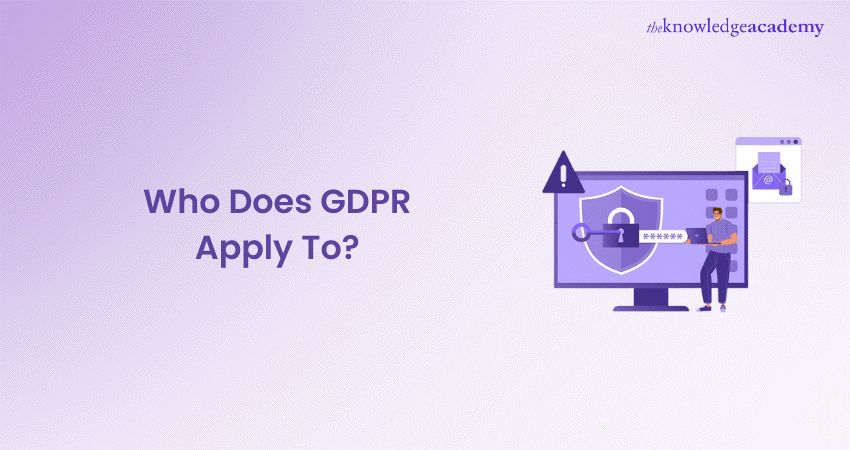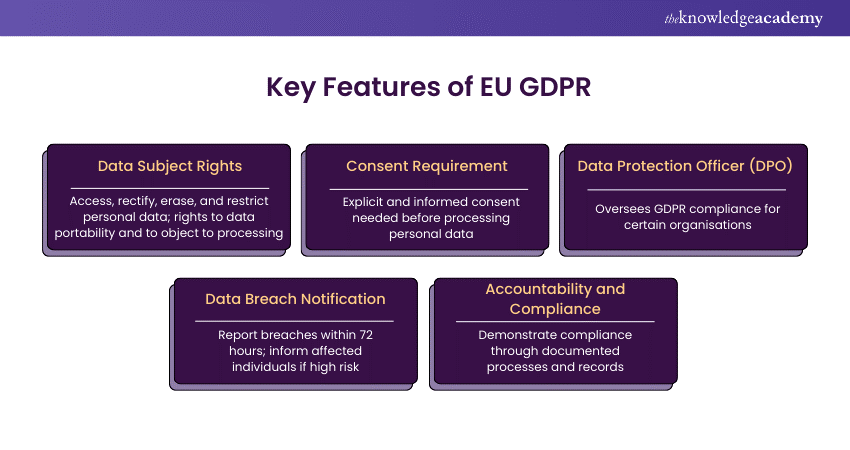We may not have the course you’re looking for. If you enquire or give us a call on + 1-866 272 8822 and speak to our training experts, we may still be able to help with your training requirements.
Training Outcomes Within Your Budget!
We ensure quality, budget-alignment, and timely delivery by our expert instructors.

Curious about who does GDPR apply to? You're not the only one! The GDPR's reach extends far and wide, creating a vast web of compliance for many organisations and even individuals. Whether you are a business owner, a data processor, or just curious about the subject, this blog will delve into the complexities of GDPR and illuminate the global impact it has. Let’s dive into the fascinating world of data protection!
Table of Contents
1) What is GDPR?
2) Who Does GDPR Apply To?
3) Who Does the GDPR Not Apply To?
4) Does GDPR Extend to Both the EU and EEA?
5) Is GDPR Applicable Beyond Europe?
6) What does it mean to offer goods and services to EU citizens?
7) Who is Responsible for the Enforcement of the GDPR?
8) Conclusion
What is GDPR?
The GDPR is a European Union regulation designed and enacted in May 2018 to streamline the regulatory environment for cloud-hosted companies. This regulation strives to benefit both businesses and EU citizens in the digital economy.

The purpose of GDPR is to govern how cloud-hosted companies handle and protect the personal data of EU citizens, ensuring that it is protected against any vulnerability.
It enforces cloud-hosted companies to implement robust safeguards, including encryption and other stringent security measures, so that their need for collecting and protecting personal data is justified.
Non-compliance with GDPR can end in severe financial penalties for cloud-hosted companies. Their penalties can reach up to 4% of their annual turnover or 16,948,000 £, whichever is higher.
Who Does GDPR Apply To?
GDPR applies to any organisation that handles or processes the personal data of EU citizens, regardless of the organisation’s location. This includes businesses within the EU and outside the EU that offer goods or services to (or monitor the behaviour of) EU citizens.
Basically, if you handle data from an EU citizen, GDPR is likely to affect you. This makes the GDPR binding on its 27 member countries of the European Union (EU) and European Economic Area (EEA). This includes Norway, Iceland and Liechtenstein, as well as any non-EU organisation that processes such sensitive information.
To summarise, the GDPR applies if:
a) A company handles personal data and is based in the EU (regardless of where the data processing takes place)
b) A company is based outside the EU but handles personal data regarding offering goods or services to individuals in the EU (or monitoring behaviour of individuals within the EU)
Need help in protecting sensitive information and privacy rights? Our GDPR Awareness Training will guide you!
Who Does the GDPR Not Apply To?
GDPR does not apply to
a) EU citizens living in the US. Article 3 of GDPR law refers to these citizens as “data subjects in Union”. So, if an EU citizen is living in the US, and a company collects personal data of such citizens living in the US, the GDPR does not apply to them.
b) Data processing done by individuals purely for household or personal activities.
c) Law enforcement activities that fall under specific national security exemptions.
d) Certain processing activities covered by the EU's Common Foreign and Security Policy (CFSP) .
Does GDPR Extend to Both the EU and EEA?
GDPR applies to all the member states of the European Union (EU) and the European Economic Area (EEA). The EEA includes EU countries in addition to Iceland, Norway and Liechtenstein. This means that GDPR protections extend to these additional countries, ensuring a broader scope of data protection.
Is GDPR Applicable Beyond Europe?
Yes, GDPR’s scope extends beyond Europe. GDPR applies to every cloud-hosted company that processes EU citizens’ data whether the company is EU-based or not.
This extraterritorial applicability means that any company in the Asia, United States, and other regions must comply with GDPR if they handle EU citizens' data.
Elevate your career as a Data Protection officer. Our comprehensive Certified Data Protection Officer (CDPO) Course is here to help!
What does it mean to offer goods and services to EU citizens?
If you are wondering what it means to deliver goods and services to EU citizens, the following two points will illustrate it
1) Offering Goods and Services to the EU Citizens
Even if you are not engaged in commercial activities, the mere intention will be interpreted as offering goods and services to EU citizens. These examples will be interpreted as offering goods and services to the EU
a) If a company’s website displays any EU member’s state currency (not all EU countries use the EUR)
b) If a company’s website is available in the language of an EU member state
c) If a company ships goods to the EU
2) Monitoring the Behaviour of EU Citizens
If a company uses cookies or tracks the IP addresses of website visitors belonging from EU countries, the GDPR will apply to that business as well.
Who is Responsible for the Enforcement of the GDPR?
Much like the ways the GDPR was implemented in nation states, the participating countries also have their own authorities responsible for enforcement.
Consider these examples
a) The Data Protection Authority (DPA) in Cyprus is the Commissioner for Personal Data Protection
b) The Hungarian National Authority for Data Protection and Freedom of Information is the data protection authority in Hungary
c) The Information Commissioner’s Office (ICO) enforces data protection laws in the United Kingdon (UK)
Standing as an independent body, the ICO not only promotes the openness of public bodies and upholds information rights, but also upholds the data privacy rights of individuals.
Consequently, the ICO has the ability to hand out fines bigger than ever for those found to be non-compliant with data protection standards.
Conclusion
Understanding who does GDPR apply to is important in today’s world that grows more and more interconnected with time. Whether you are within the EU or beyond its borders, GDPR’s reach can affect you if you handle EU citizens’ data. This blog has shed light on GDPR's scope and its global implications, ensuring that you are well-prepared to navigate its requirements. It’s about staying compliant, protecting personal data, and embracing the crucial principles of data privacy!
Looking to expand your data privacy expertise? Sign up for our comprehensive Data Privacy Awareness Course!
Frequently Asked Questions

EU citizens living in the US and data processing carried out by individuals purely for household or personal activities are exempt from GDPR in the UK. Additionally, GDPR does not apply to law enforcement activities that fall under specific national security exemptions

GDPR applies to data controller or processors that provide the means for processing personal data pertaining to EU. Additionally, Data Protection Officers (DPO) remains liable for non-compliance with general employment, contracts, civil and criminal rules, as set out by the domestic laws of the relevant member states.

The Knowledge Academy takes global learning to new heights, offering over 30,000 online courses across 490+ locations in 220 countries. This expansive reach ensures accessibility and convenience for learners worldwide.
Alongside our diverse Online Course Catalogue, encompassing 17 major categories, we go the extra mile by providing a plethora of free educational Online Resources like News updates, Blogs, videos, webinars, and interview questions. Tailoring learning experiences further, professionals can maximise value with customisable Course Bundles of TKA

The Knowledge Academy’s Knowledge Pass, a prepaid voucher, adds another layer of flexibility, allowing course bookings over a 12-month period. Join us on a journey where education knows no bounds.

The Knowledge Academy offers various GPDR Course including the Certified EU General Data Protection Regulation (EU GDPR) Foundation and Certified EU General Data Protection Regulation (EU GDPR) Practitioner courses. These courses cater to different skill levels, providing comprehensive insights into Data Protection.
Our Data Protection Blogs cover a range of topics related to GDPR, offering valuable resources, best practices, and industry insights. Whether you are a beginner or looking to advance your GDPR knowledge, The Knowledge Academy's diverse courses and informative blogs have got you covered.
Upcoming IT Security & Data Protection Resources Batches & Dates
Date
 Certified Data Protection Officer (CDPO)
Certified Data Protection Officer (CDPO)
Fri 10th Jan 2025
Fri 14th Feb 2025
Fri 11th Apr 2025
Fri 23rd May 2025
Fri 8th Aug 2025
Fri 26th Sep 2025
Fri 21st Nov 2025







 Top Rated Course
Top Rated Course



 If you wish to make any changes to your course, please
If you wish to make any changes to your course, please


